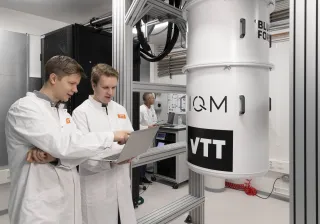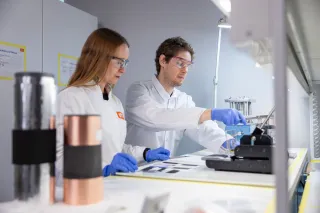Quantum is one of the buzzwords you hear there and here, but what does it mean?
In some cases such as in quantum healing, the word quantum may not mean anything really, at least nothing with a solid scientific basis. Also quantum detergents and foods make me rather amused than seriously thinking that there is quantum technology inside.
However, these examples do not imply that all quantum products are nonsense. On the contrary, the quanta will soon work their way at least to sensors, computers, and communication.
For example, quantum dot displays use the quantization of energy levels in nano-sized particles to produce a higher-quality image. Although all current commercial TVs use quantum dots rather as colour filters or converters than actual light sources, we expect to have light-creating quantum dot displays in the market relatively soon.
What makes it quantum
When scientists have examined objects at the lowest energies, they have observed that not all energy states are allowed. In fact, there is only a discrete set of possible energy states a system may have. Nothing in between exists.
In everyday life, we do not typically encounter this energy quantization, since the smallest energy step from an energy state to another is negligibly small and washed out by noise. But it is still most real. Energy quantization was first observed in atoms and in the recent decades, in man-made devices leading to the rise of quantum technology.
I define quantum technology as practical devices or processes where individual energy states are utilized in a controllable way.
The most exciting thing about the energy quantization is not that the intermediate energies are prohibited, but its consequences. Promoting a quantum system from a low-energy state to the next is like climbing a ladder, but not quite. Instead of a person moving up in energy in a continuous manner when making their way from one step to the other, the energy quantization forces the quantum system to gradually disappear from the low-energy state and correspondingly appear at the high-energy state.
This property of being partly in both states at the same time is called superposition and it is at the heart of quantum technology.
The quantum revolution
The revolutionary impact of quantum technology goes well beyond TVs. The quanta will work their way at least to sensors, computers, and communication. In fact, machines using single quanta of light, or photons, to transmit data securely have already been commercially available for more than a decade.
Sensors may also get a boost from quantum. The superposition of a single system may already help, for example, in detecting magnetic fields more precisely. But the full control of whole set of quantum systems has even greater advantages to improve the signal-to-noise ratio in sensors.
The greatest expectations for the quantum revolution are definitely on the quantum computer. The promise of solving some of the hardest computational problems known in a feasible time seems so intriguing that scientists have been working on demonstrating the basic principles of quantum computing for decades. Recently, the field has taken off the ground like a fighter jet with billions of euros invested globally on building quantum computers that can provide advantage over the typical computers.
It is exciting to see how all the scientific work that was considered not too long ago purely academic is now put into practical use. Finally, a quantum physicist can sleep with a good conscience – I am making a real difference.





